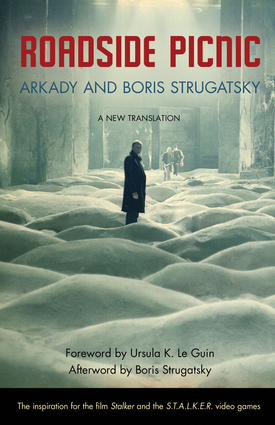
translated from the (uncensored) Russian by Olena Bormashenko
(censored version originally translated into English by Antonina L. Bouis, 1977)
May 1, 2012
224 pages
grab a copy here or through your local independent bookstore
The great thing about Strugatsky novels is that they’re all brilliant in their own unique ways. The Dead Mountaineer’s Inn is wild and strange and mysterious; Snail on the Slope is darkly enigmatic; The Inhabited Island is terrifyingly believable. And Roadside Picnic, especially in this uncensored and newly-translated version, is a fascinating combination of science fiction, mystery, and thriller.
Though I haven’t yet seen Andrei Tarkovsky’s 1979 film Stalker, loosely based on the novel and with a screenplay written by the Strugatskys themselves, I’ve heard good things. Nonetheless, you need to read this version of Roadside Picnic because the book forces you to imagine what some of these mysterious pieces of alien technology might actually look like. “Empties,” “hell slime,” a golden ball that grants wishes–images like these are most powerful when they’re left to the imagination.
This is not a story about a particular event, but about its aftermath. Before Roadside Picnic begins, we learn, several areas on Earth were struck by an unknown force, and in those “zones” (as they come to be called), the laws of physics were suspended. The main action of the novel revolves around a “stalker” named Red who, like many other men looking to make a living in the zone’s periphery, periodically enters the area to extract alien technology and then sell it on the black market. Stalkers like Red exist in tension with an international organization that seeks to collect the objects and study them, with an eye toward making them useful for humanity.
As a Nobel Prize-winning scientist muses at one point, though, humans taking objects from the zone and incorporating them to certain aspects of everyday life is like taking a sledgehammer to a nut. Or maybe an egg. The point is, while humans might figure out how to make, say, a black orb sparkle, they still don’t know why it sparkles or for what purpose, or even what the black orb is, exactly. One hypothesis is that it is a bit of space folded in on itself. Meanwhile, women wear these orbs as jewelry.
Each time Red ventures into the hostile zone, where any misstep will vaporize, flatten, burn, or melt him in an instant, he loses confidence in his own ability to return alive. He and his wife worry about their child who, thanks to some mysterious force in the zone, was born with fur and pupil-less eyes and can’t speak. Nobody knows if those responsible for changing these areas of the Earth intend to visit in person, or if the Event was actually an attack, or (as the Nobel scientist suggests) the zones are just remnants of a kind of alien “roadside picnic.” Earth, for those aliens, was merely a park, and the mysterious technology left behind was the equivalent of their trash after they entertained themselves and then went back home. The latter suggests, in the vein of many Lem stories, that perhaps alien intelligences aren’t interested in humanity or can’t even perceive it. Perhaps Earth was just a patch of grass onto which litter was thrown. A humbling theory, indeed.
Thanks to Bormashenko’s beautiful translation and the Chicago Review Press, Anglophone readers can fully enjoy the uncensored version first written by the Strugatskys. Boris Strugatsky’s afterword is especially interesting in its documentation of the rough road the novel traveled before it was published for the first time. So grab yourself a copy and let me know what you think about it in the comments!

1 comment on “Review: Roadside Picnic by Arkady & Boris Strugatsky”